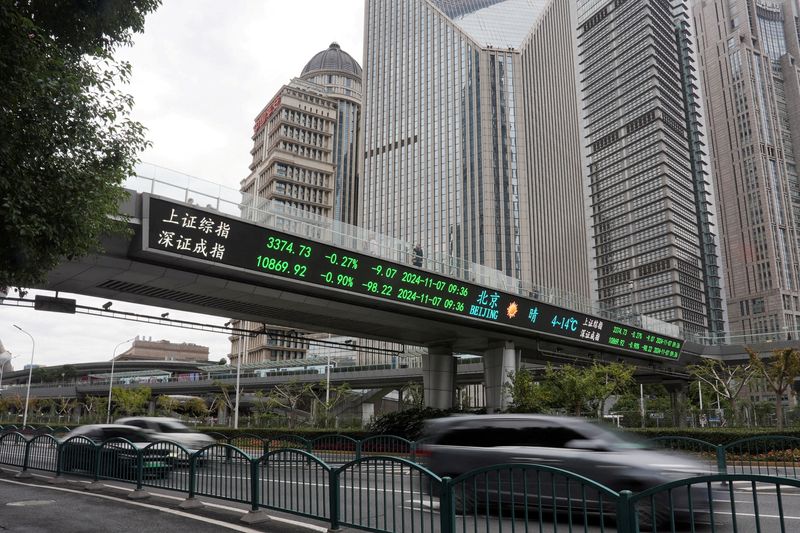By Samuel Shen and Summer Zhen
SHANGHAI/HONG KONG (Reuters) – Day-trader Lu Delong’s optimism for a China stocks rally quickly evaporated in the first week of the year when, just three months after positioning for a surge fuelled by Beijing’s stimulus pledges, he was forced to dump shares and tally his losses.
Many retail investors like Lu sold shares in early January, precipitating the weakest start to the new year in almost a decade for China’s $11 trillion stock market.
“The savage sell-off is beyond my understanding. I haven’t seen Trump announce anything fresh against China,” said Lu, referring to the uncertainties surrounding U.S. trade policy under President-elect Donald Trump.
“The only plausible explanation is that the market is squeezing the government for more forceful policies,” said Lu, who turned bullish on Chinese stocks in late September but now plans to hold just cash in the run-up to the Chinese Lunar New Year holidays starting late January.
Disillusioned with economic policies and the worries around U.S. trade tariffs, retail investors are selling, threatening to knock Chinese shares back into a years-long downtrend.
Chinese stocks saw their first annual gain in 2024 following an unprecedented three-year decline set off by the COVID-19 pandemic, property sector woes and weak consumer confidence.
Retail money accounts for roughly 70% of China’s share trading, hence there is a risk that a sell-off could trigger a disorderly unwinding of leveraged bets and losses which could stymie Beijing’s efforts to stabilise capital markets.
The government needs a sustainable bull market to fund economic revival but another boom-and-bust would “destroy wealth, hurt consumption and harm China’s economy”, said Dong Baozhen, chairman of Beijing-based asset manager Lingtong Shengtai.
A sell-off would mean another vote of no-confidence from investors who have already vented pessimism over China’s economy in the yuan and bond markets, prompting the government to step in to arrest falls in the currency and bond yields.
‘COLD WATER’
Markets seemed on the cusp of a recovery in late September when Beijing announced interest rate cuts and intent to defend markets. Desperate investors dived into stocks and drove the benchmark index up a whopping 40% over two weeks.
The broad market then cooled as investors waited for more concrete policies, but retail trading remained active, evidenced by high turnover, soaring prices of small-cap shares and a rapid build-up of leveraged bets.
Signs of disillusionment emerged early in 2025, with shares in Shanghai and Shenzhen down roughly 6% so far, making them the world’s worst-performing major markets.
“Policymakers sparked a blaze over the dry wood, but the fire has been put out by cold water,” said retail investor Zhang Jianan, referring to half-hearted policy implementation.
The People’s Bank of China kicked off a 500-billion-yuan ($68 billion) swap facility to fund share purchases by institutional investors but by end-2024 only 50 billion yuan under the scheme was tapped, indicating institutional scepticism.
“When you see financial institutions ploughing money into treasury bonds and high-dividend stocks, you know those with deep pockets are pessimistic toward the economy. Market behaviours don’t lie,” Zhang said.
Foreign investors have also withdrawn from the market.
Global hedge funds raised exposure to China during last year’s stimulus-led rally but soon unwound them, while global long-only funds “have stayed largely on the sideline”, Goldman Sachs wrote.
WAITING GAME
The biggest mismatch could be that the “market expects a ‘big bang’ while Beijing is in a ‘wait and see’ mode, pending growth conditions and Trump’s policies”, said Yan Wang, chief emerging markets and China strategist at Alpine Macro (BCBA:BMAm).
“For now we still view China as a tactical trade.”
Hao Hong, partner and chief economist at GROW Investment, said Trump’s threat to levy tariffs of 60% on Chinese goods is a huge source of uncertainty.
“The market is extremely volatile right now, and Trump is highly unpredictable, so it’s not a good time to rush in,” said Hong, who has no China stocks in his multi-asset fund.
“Now it’s just a matter of waiting, waiting for policy changes. If there’s no opportunity, don’t act. Be patient.”
With half a trillion yuan worth of borrowed money ploughed into the market since end-September, a disorderly retail retreat could trigger margin calls and the ensuing stampede could knock the Shanghai index below the key 3,000-point level this month, said Shanghai-based investor Mao Jian.
The Shanghai benchmark ended Monday at 3,160 points, 5% above that level, which is seen by many investors as psychologically important and by state funds as worth defending.
To forestall another crisis, China should aggressively expand the central bank’s balance sheet and set up a sovereign market stabilisation fund, as “when the wood is wet, you need a much bigger fire to set it ablaze”, retail investor Zhang said.
($1 = 7.3320 Chinese yuan)




























